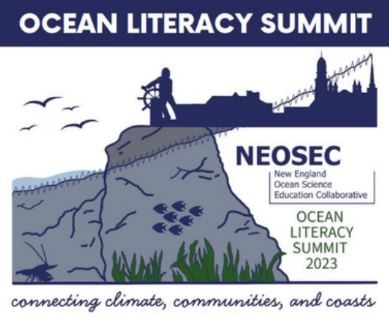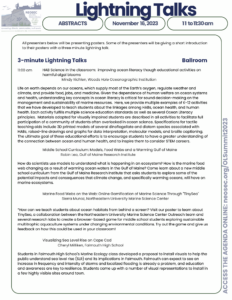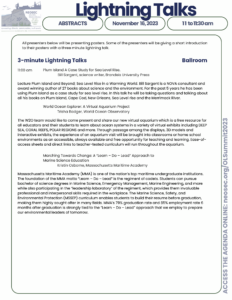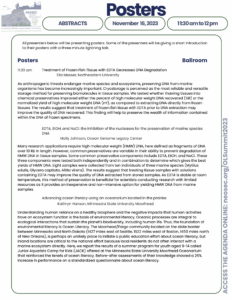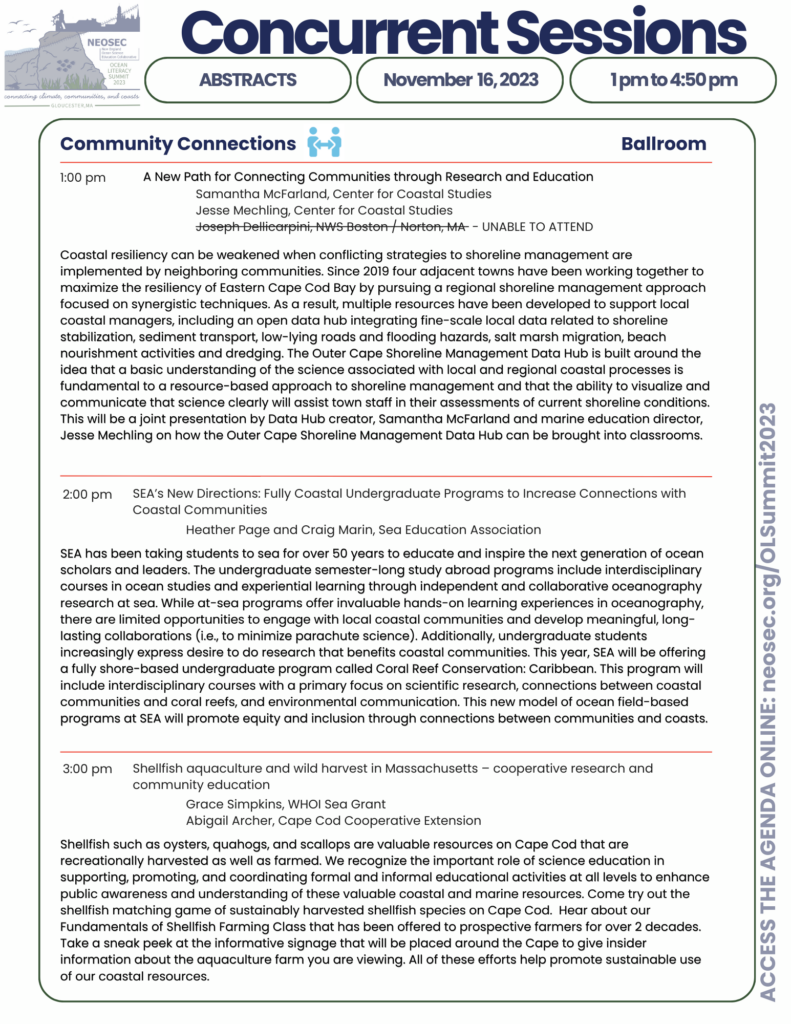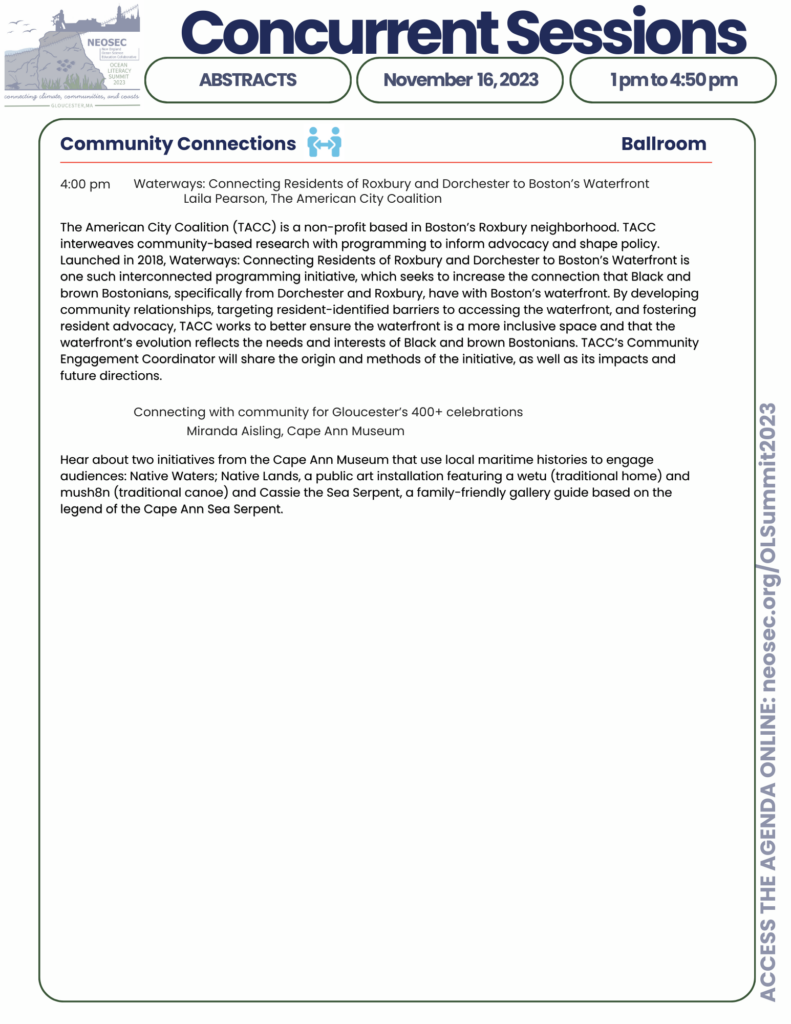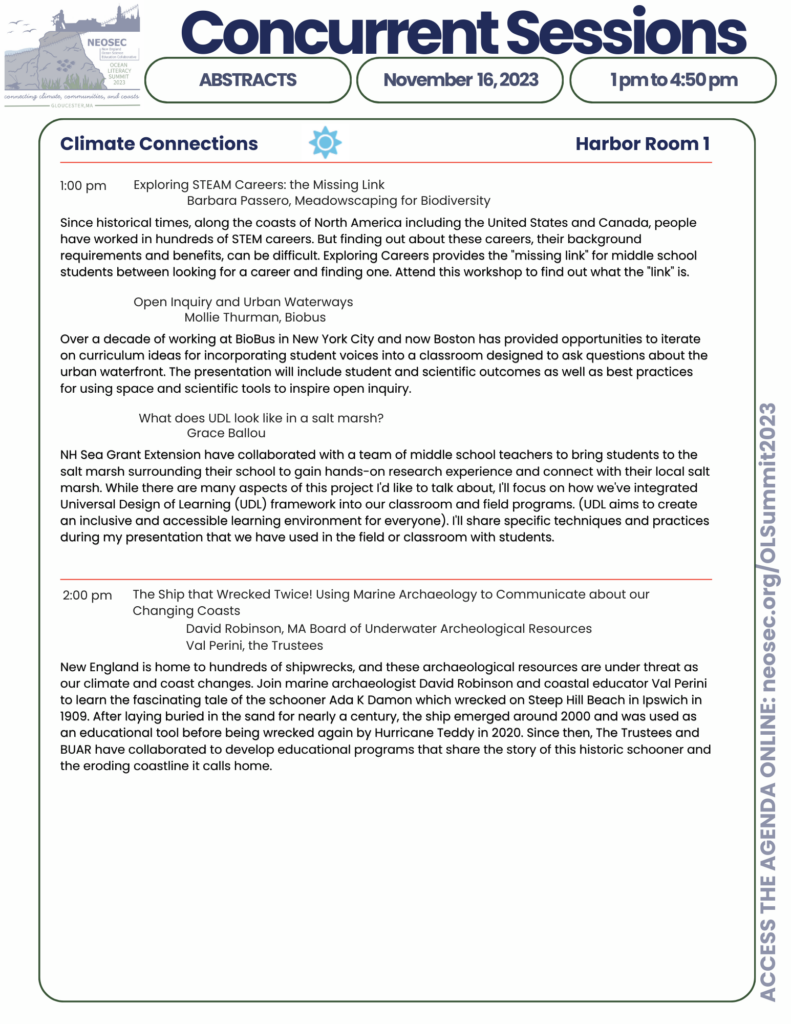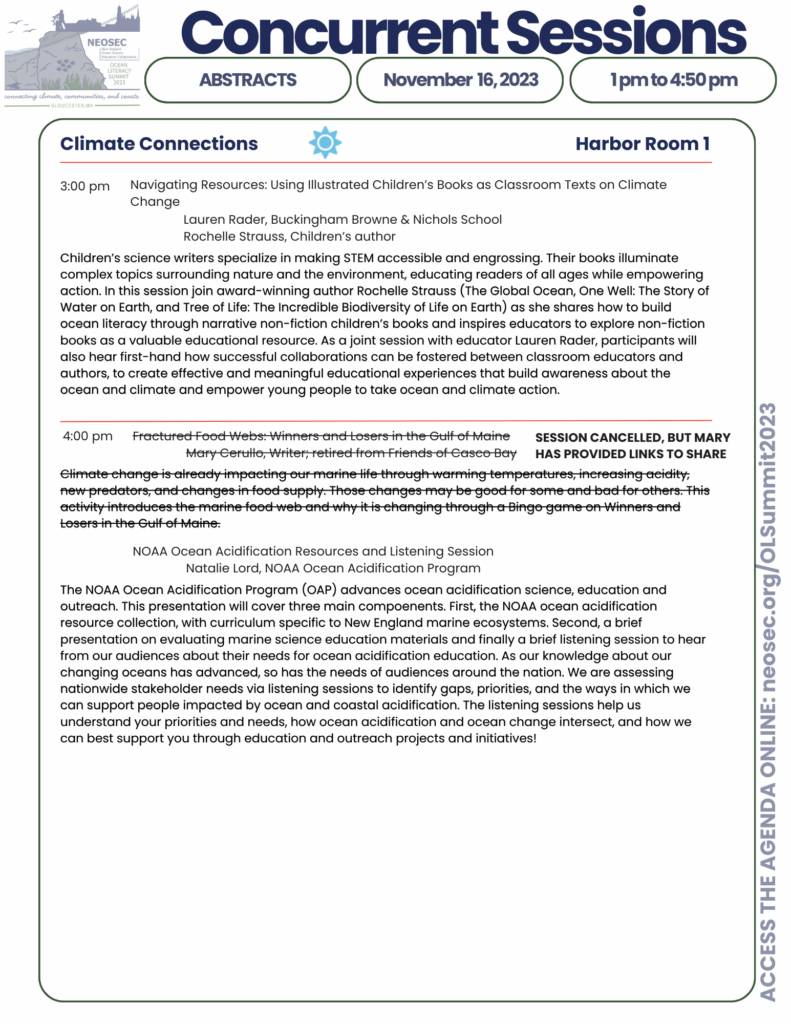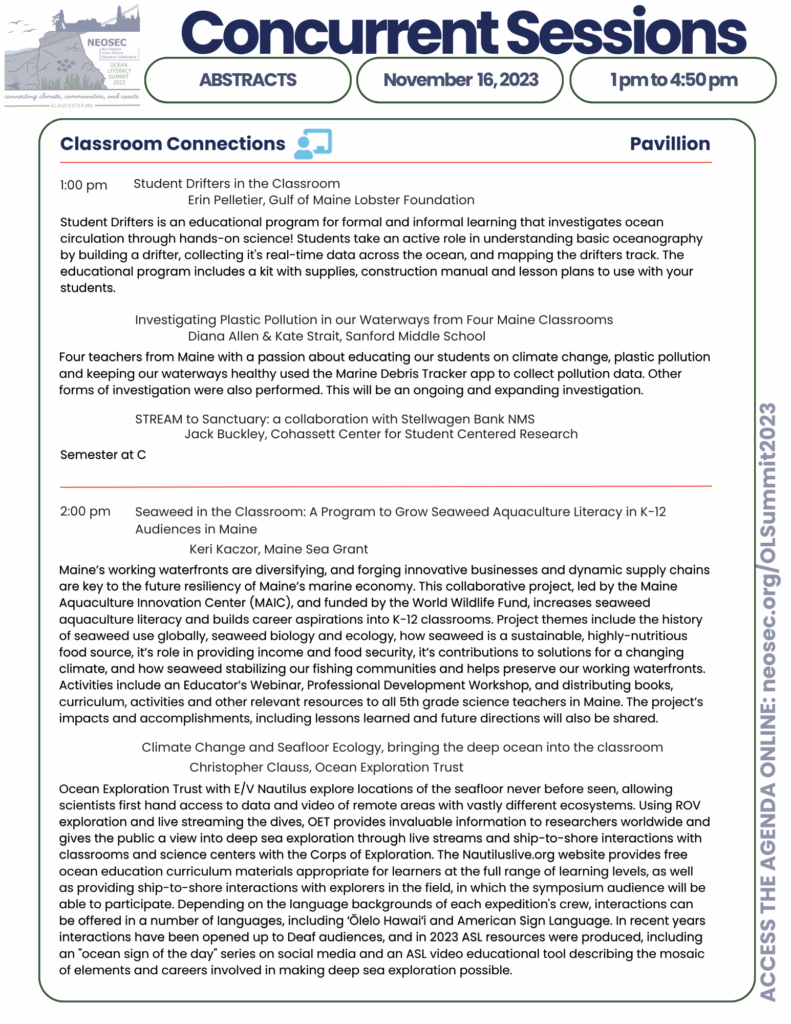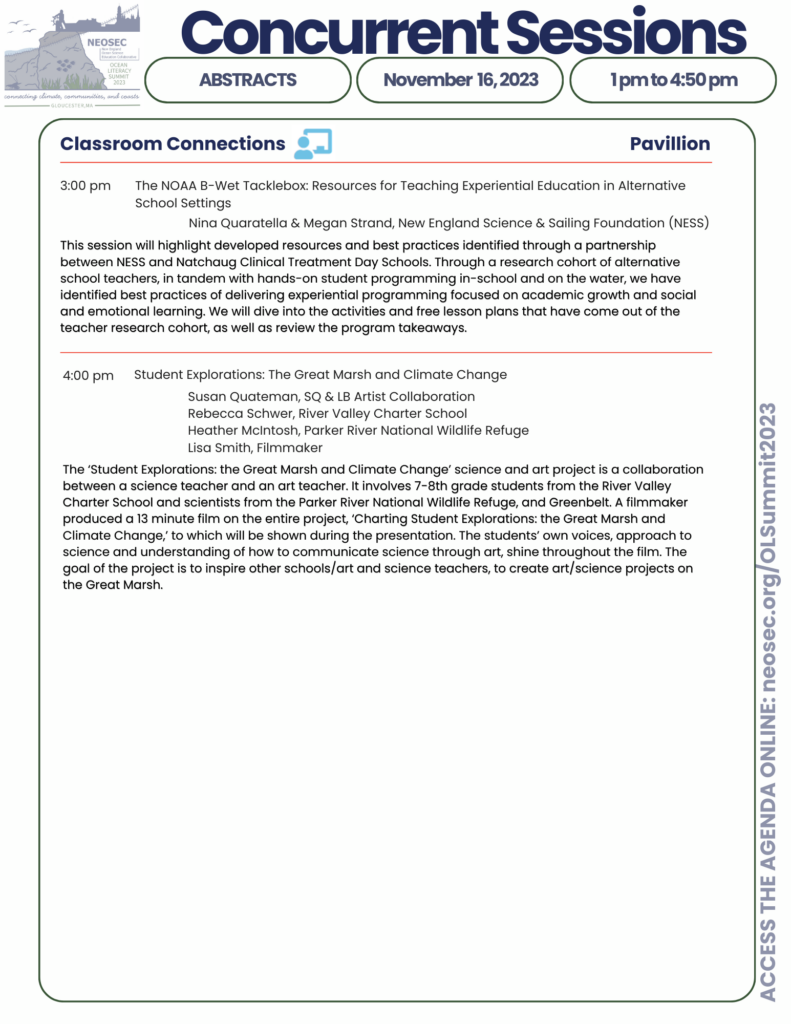8:30am - REGISTRATION
Registration and Morning Beverages
9:00am - WELCOME TO THE 2023 OCEAN LITERACY SUMMIT
Welcome by Nicki Rosenfeld, NEOSEC Chair, Maritime Aquarium of Norwalk, and Aimee Bonanno, NEOSEC Program Manager
9:15am - KEYNOTE: Assessing Coastal Flood Risk with Communities
Keynote by Gayle Bowness, Municipal Climate Action Program Manager, Gulf of Maine Research Institute
Sea-level rise is driving more frequent and widespread coastal flooding along Maine’s ~5,400 miles of tidally influenced coastline, and communities face an urgent need to adapt. Flood projections, both near and long-term, that combine local observations of water levels and flood impacts are needed for adaptation. Maine faces significant barriers to building coastal flood resilience due to sparse tide gauge coverage and observation-based flood thresholds; and the lack of a network of researchers, civic leaders, engaged community members (particularly youth), and resilience practitioners ready to leverage data to support coastal planning and resilience. To address these barriers, the Gulf of Maine Research Institute is partnering with community-based organizations, educators, municipal leaders, and resilience practitioners to implement a community-science project that includes innovative technology and intergenerational engagement to generate local data and build capacity for climate action. We believe that all these groups need to be participants in building community resilience – particularly youth, as climate change is a problem that spans lifetimes and thus requires methods that invite intergenerational knowledge and values. We’ll share our approach to connecting communities with coastal research and elevating youth voice in the municipal-planning process.
10:00am - IMMERSIVE DIVERSITY PANEL: Is there an Ethical Process to Co-creating in Communities of Color?
An immersive storytelling session on diverse perspectives in ocean science and their importance. Led by Alex DeCiccio, Patrick Flanagan, Ryan Campos, and Jess Kaelblein from University of Rhode Island.
This session will examine the issue of “parachute science,” curation, creation, and other forms of extractive, transactional practices in vulnerable communities. To focus the conversation, the session panelists will share their experiences working on “Oceans Tell Stories Through People” and “Water Tells Stories Through People,” which are a series of storytelling events that center local storytellers who examine the intersection between historical racialized oppression and injustice and various environmental problems in their communities. The session participants will hear how the events’ creators, artists, and facilitators have evolved their process, intentions, and the philosophical underpinnings, throughout their journey to establish a mutually supportive ethical process towards co-creating storytelling events about scientific and environmental issues in communities and spaces of color.
11:00am - LIGHTNING TALKS & POSTERS
Our networking and poster hour will start with a few short talks in the ballroom followed by time to connect with poster presenters and exhibitors.
All presenters below will be presenting posters. Some of the presenters will be giving a short introduction to their posters with a three minute lightning talk.
3-Minute Lightning Talks:
- HAB Science in the classroom: improving ocean literacy though educational activities on harmful algal blooms – Mindy Richlen, Woods Hole Oceanographic Institution
- Middle School Curriculum: Models, Food Webs and a Warming Gulf of Maine – Robin Lea, Gulf of Maine Research Institute
- Marine Food Webs on the Web: Online Gamification of Marine Science Through “TinySea” – Sierra Munoz, Northeastern University Marine Science Center
- Visualizing Sea Level Rise on Cape Cod – Cheryl Milliken, Falmouth High School
- Plum Island A Case Study for Sea Level Rise – Bill Sargent, science writer, Brandeis University Press
- World Ocean Explorer: A Virtual Aquarium Project – Trisha Badger, World Ocean Observatory
- Marching Towards Change: A “Learn – Do – Lead” Approach to Marine Science Education – Kristin Osborne, Massachusetts Maritime Academy
- Treatment of Frozen Fish Tissue with EDTA Decreases DNA Degradation – Ella Messer, Northeastern University
- EDTA, EtOH, and NaCl: the inhibition of the nucleases for the preservation of marine species DNA – Molly Johnson, Ocean Genome Legacy Center
- Advancing ocean literacy using an oceanarium located in the prairies – Kathryn Hanson, Minnesota State University Moorhead
12pm - LUNCH
Join us in the Ballroom for lunch and networking.
1-4:50pm - CONCURRENT SESSIONS
During the afternoon we will have contributed talks in 3 rooms at once: Community Connections in the Ballroom, Climate Connections in the Harbor Room, and Classroom Connections in the Pavilion.
COMMUNITY
BALLROOM
CLIMATE
HARBOR ROOM
CLASSROOM
PAVILION
1pm
A New Path for Connecting Communities through Research and Education – Samantha McFarland, Center for Coastal Studies, Jesse Mechling, Center for Coastal Studies
Exploring STEAM Careers: the Missing Link – Barbara Passero, Meadowscaping for Biodiversity
Open Inquiry and Urban Waterways – Mollie Thurman, Biobus
What does UDL look like in a salt marsh? – Grace Ballou
Student Drifters in the Classroom – Erin Pelletier, Gulf of Maine Lobster Foundation
Investigating Plastic Pollution in our Waterways from Four Maine Classrooms – Diana Allen & Kate Strait, Sanford Middle School
STREAM to Sanctuary: a collaboration with Stellwagen Bank NMS – Jack Buckley, Cohassett Center for Student Centered Research
2pm
SEA’s New Directions: Fully Coastal Undergraduate Programs to Increase Connections with Coastal Communities – Heather Page and Craig Marin, Sea Education Association
The Ship that Wrecked Twice! Using Marine Archaeology to Communicate about our Changing Coasts – David Robinson, MA Board of Underwater Archeological Resources and Val Perini, the Trustees
Seaweed in the Classroom: A Program to Grow Seaweed Aquaculture Literacy in K-12 Audiences in Maine – Keri Kaczor, Maine Sea Grant
Climate Change and Seafloor Ecology, bringing the deep ocean into the classroom – Christopher Clauss, Ocean Exploration Trust
3pm
Shellfish aquaculture and wild harvest in Massachusetts – cooperative research and community education – Grace Simpkins, WHOI Sea Grant, and Abigail Archer, Cape Cod Cooperative Extension
Navigating Resources: Using Illustrated Children’s Books as Classroom Texts on Climate Change – Lauren Rader, Buckingham Browne & Nichols School, and Rochelle Strauss, Children’s author
The NOAA B-WET Tacklebox: Resources for Teaching Experiential Education in Alternative School Settings – Nina Quaratella & Megan Strand, New England Science and Sailing Foundation
4pm
Waterways: Connecting Residents of Roxbury and Dorchester to Boston’s Waterfront – Laila Pearson, The American City Coalition
Connecting with community for Gloucester’s 400+ celebrations – Miranda Aisling, Cape Ann Museum
NOAA Ocean Acidification Resources and Listening Session – Natalie Lord, NOAA Ocean Acidification Program
Student Explorations: The Great Marsh and Climate Change – Susan Quateman, SQ & LB Artist Collaboration, Rebecca Schwer, River Valley Charter School, Heather McIntosh, Parker River National Wildlife Refuge, and Lisa Smith, Filmmaker
4:50pm - CLOSING REMARKS
Ending thoughts, wrap up, and evening suggestions.


